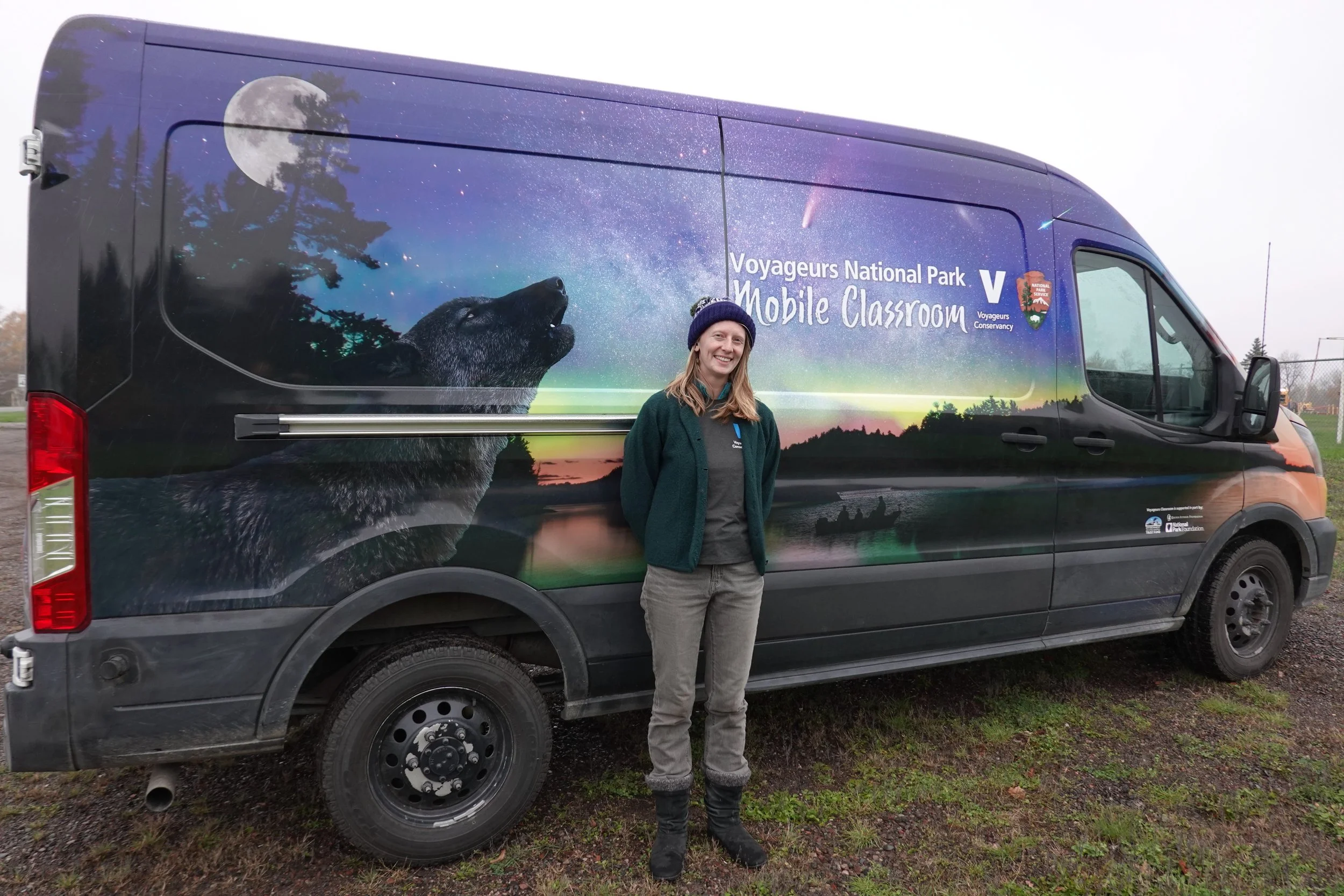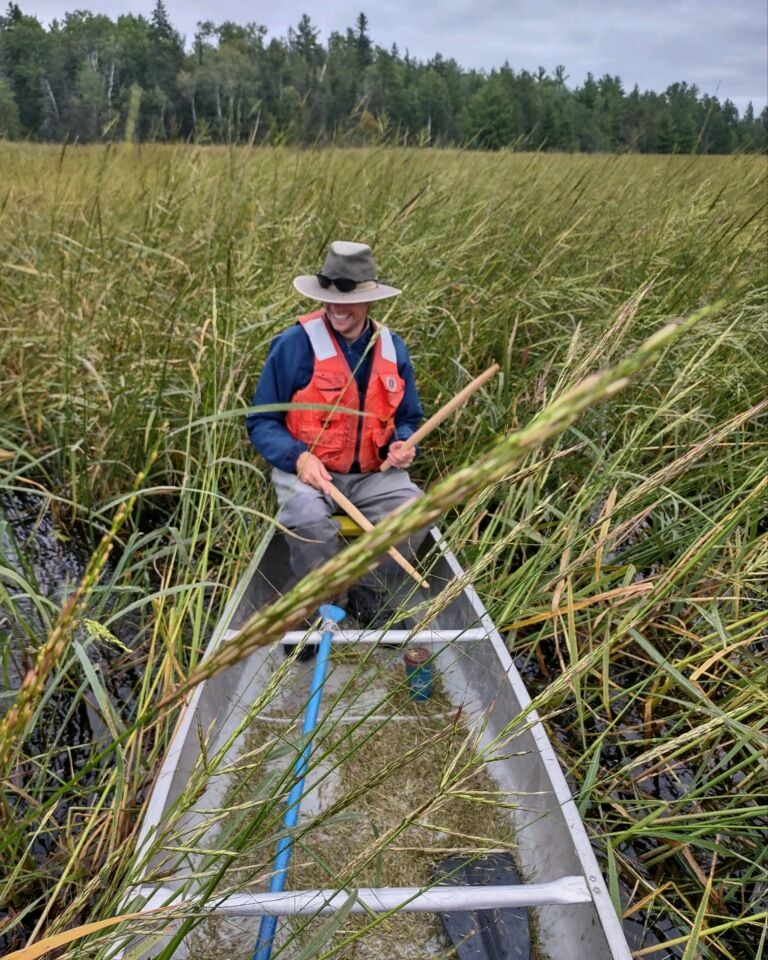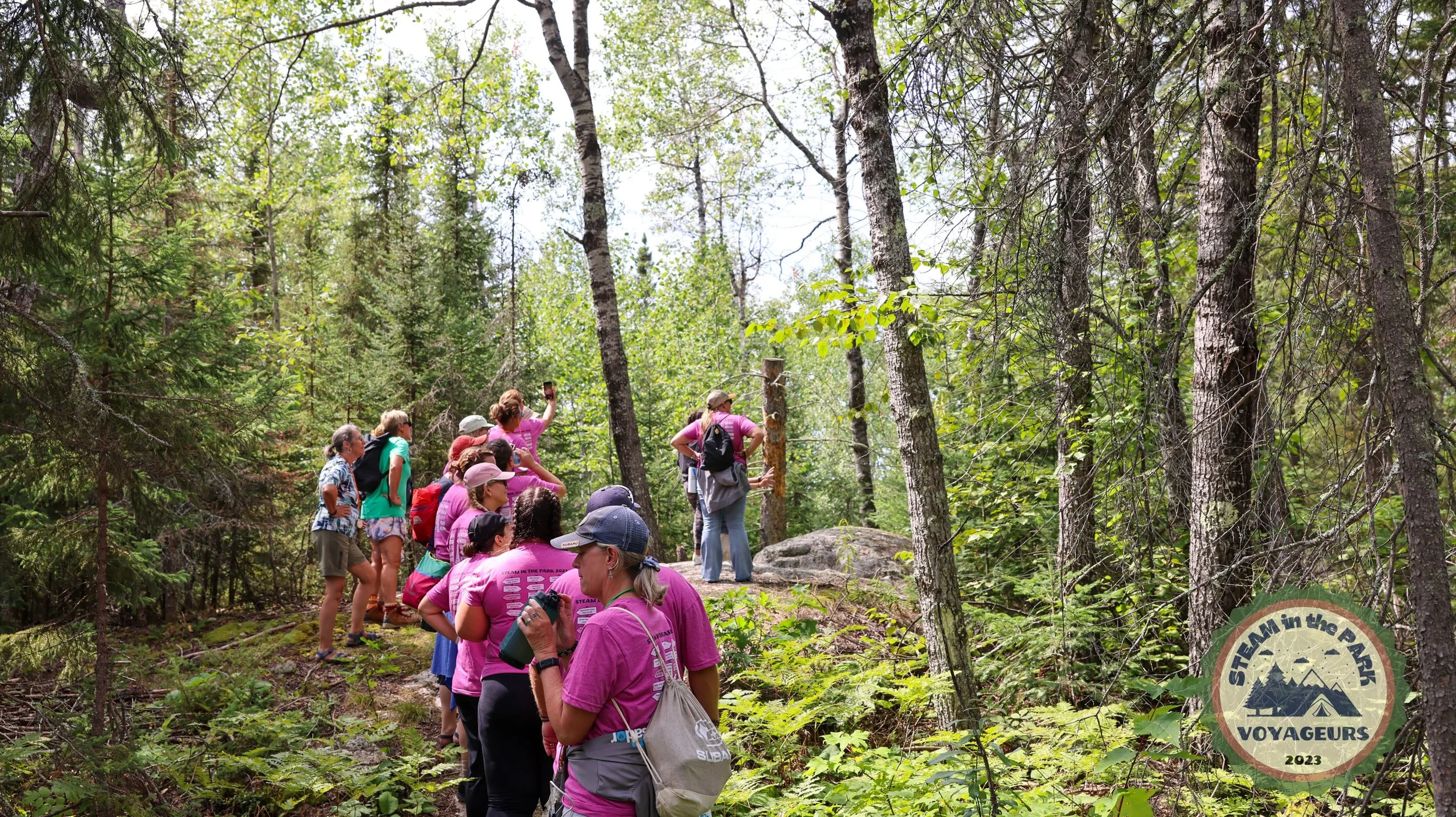Top Ten Voyageurs Moments of 2023
#1 Breaking Ground on the Crane Lake Visitor Center
Crane Lake Township is busy constructing a new facility and RV campground. The new facility will serve as a new visitor center, leased by the National Park Service, open date to be announced in 2024. The photo shows extensive recent progress. Voyageurs Conservancy is partnering with the community and park to fund a design plan for permanent exhibits to showcase to visitors and share the deep cultural history, Dark Sky opportunities and recreation in the area.
#2 Dark Sky Initiative Illuminates Wonder, Inspires Discovery
In partnership with the National Park Service, our Dark Sky Programs reached new heights, touching the lives of 2,140 adults and children through captivating events like the Voyageurs Star Party, telescope and constellation tours, and engaging classroom programs. Thanks to the incredible generosity of Curtis Wong, we welcomed a state-of-the-art Obsession telescope that added a new touch of magic to our dark sky programs.
In 2023, we launched our winter Boreal Stargazing Week, a week of discovery, stargazing, and nighttime wonder. In its inaugural year, this impactful week of programs reached over 9,000 students from Minnesota, Maryland, California, Florida, Tennessee, and more. This milestone promises to be the first of many in our ongoing mission to inspire, educate, and preserve the beauty of Voyageurs’ dark skies.
#3 Voyageurs waters safeguarded through proactive zebra mussel monitoring
Voyageurs National Park, Voyageurs Conservancy, and partners continued to diligently monitor and prevent the spread of zebra mussels in the park. Hear from Cat Berrick, Wildlife Technician, on this important work:
Searching for zebra mussels in Black Bay of Rainy Lake where microscopic zebra mussel larvae were found in 2021, our dive team found no adult zebra mussels. Since invasive zebra mussels attach to hard surfaces, often in areas with high boat traffic, our divers searched for zebra mussels along rocks, docks, boats, and other high suspect areas in Black Bay.
They did, however, find many native mussels such as the fatmucket mussel in this photo. Zebra mussels can attach to the hard surfaces of native mussels and may in fact smother them. Thousands of the invasives can attach to a single native mussel blocking off the mussel’s siphon or means of breathing. When zebra mussels are present, native mussel populations often decline.
Your efforts to clean, drain, and dry for five days, anytime you leave one body of water before entering another, helps protect the more than 50 species of native mussels in Minnesota.
#4 Kabetogama Lake Boat Launch is REPLACED
This fall, Voyageurs National Park revitalized the Kabetogama Lake Boat Launch! The original boat launch ramp was built in the 1980s and is in a deteriorated condition. The project increased visitor accessibility, safety, and addressed a backlog of deferred maintenance at Minnesota’s national park.
#5 Voyageurs Classroom Bridges Classrooms, Seasons, and Communities
Our new Voyageurs Mobile Classroom brought the wildlife, waters, and cultural heritage of Voyageurs National Park to schools across the state. This exciting initiative has already reached 450+ students in Duluth, MN. Additionally, Voyageurs Conservancy brought local students on Voyageurs National Park excursions across all seasons! This includes supporting the return of our Winter Snowshoe Programs that were previously canceled during the pandemic. These interactive field experiences brought hundreds of K-12 students out of their desks on the trails and the waters of their national park.
Voyageurs Conservancy was approved by the Legislative-Citizen Commission on Minnesota Resources (LCCMR) to receive $994,000 in funding over three years from Minnesota’s Environment and Natural Resources Trust Fund (ENRTF). This major grant will support the next phase of the Voyageurs Classroom - connecting 17,000 Minnesotans to the unique cultural and ecological space of Voyageurs National Park through outdoor, classroom, and virtual learning opportunities!
#6 Celebrating a flooding-free summer
With a sigh of relief, we enjoyed the park’s peak summer season without flooding, a stark difference from the challenging and historic flooding of summer 2022. This reprieve granted the National Park Service and local businesses the opportunity to showcase Voyageurs’ serene beauty, and welcome new and longtime visitors with open arms.
Free from flooding, anglers were able to enjoy world-class fishing once again. Many stories over prized catches were shared including this incredible memory captured by Tim Middendorf:
“My twin brother Tom caught the largest fish of his life, not in Alaska, but right here on Kabetogama. He was fishing walleyes and caught this lunker, estimated at 70 pounds, after a 2 hour fight. It was an experience of a lifetime, and would not have worked out without an able assist on a larger net from a passing fishing boat.”
#7 Invasive cattailS removed, freeing critical habitat for native wetland and wild rice
Wetland restoration work continued in full force near the Rainy Lake Visitor Center-Black Bay area. The Voyageurs Wetland Restoration Initiative aims to restore the biodiversity of 500 acres of key wetlands –removing invasive cattails, creating better habitats for fish and waterfowl, and bringing back wild rice!
Voyageurs Conservancy was proud to provide $20,000 in funding for this important restoration work in 2023.
#8 STEAM in the park welcomes teachers from across the country
This summer we welcomed teachers from eight states to Voyageurs National Park as part of the STEAM in the Park experience, and had an incredibly immersive week learning, exploring, and creating new ways to connect students to Voyageurs National Park. These teachers wrote curriculum that will build our library of lessons for our Voyageurs Classroom Initiative, and they are now ambassadors for the wonder and learning to be found at Voyageurs National Park.
#9 Camp Marston turns 100!
Between 1923-1939, students from Iowa State University traveled hundreds of miles to Camp Marston in Browns Bay. Today, Camp Marston is a designated Visitor Destination Site within Voyageurs National Park. The site serves as reminder of the “The Spirit of Rainy Lake”, camp comradery, and sense of purpose in a wild landscape. Learn what it was like to be a student at the iconic Camp Marston and celebrate its 100th year!
#10 Voyageurs AREA recognized for groundbreaking wolf and moose research projects
Voyageurs National Park is a refuge and living laboratory to research captivating megafauna including moose and wolves. Park Wildlife Biologist Dr. Steve Windels was honored with the 2023 Distinguished Moose Biologist Award at the 55th North American Moose Conference and Workshop for his leadership in a 15-year moose monitoring program.
The Voyageurs Wolf Project conducted research on the summer predation and reproductive habits of wolves, receiving national press attention. Recent studies have found that wolves ambushing and preying on beavers has impacted the trajectory of forests. Additionally, new research has found a strong link between human development and where wolves successfully hunted deer fawns. Due to its undisturbed habitats and diverse ecosystems, Voyageurs National Park continues to be a premier location for wildlife research.












